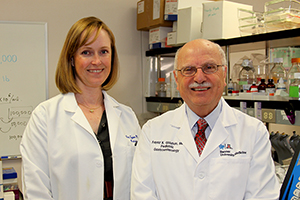Baylor College of Medicine
See the following -
Bio-IT World Announces the Winners of Its Tenth Annual Best Practices Awards
Bio-IT World announced the winners of its tenth annual Best Practices Awards competition this morning in a plenary session at the 2014 Bio-IT World Conference & Expo in Boston. Grand prize winners were named in five life sciences categories highlighting best practices in clinical trial IT, research infrastructure, bioinformatics, cloud computing and data management from AstraZeneca and Tessella, U-BIOPRED, the Pistoia Alliance, Baylor College of Medicine, and Genentech. Read More »
- Login to post comments
Electronic Health Records: First, Do No Harm?
EHRs are commonly promoted as boosting patient safety, but are we all being fooled? InformationWeek Radio investigates. Read More »
- Login to post comments
Flesh-eating Bacteria, Cancer-causing Chemicals, and Mold: Harvey and Irma's Lingering Health Threats
 In the weeks following Hurricane Irma, parts of Florida have been awash in millions of gallons of sewage. Meanwhile, in Texas, oil refineries and chemical plants have dumped a year’s worth of cancer-causing pollutants into the air following Hurricane Harvey. In both states, doctors are on the lookout for an uptick in respiratory problems, skin infections, and mosquito-borne diseases brought on by the water and mold the storms left behind...
In the weeks following Hurricane Irma, parts of Florida have been awash in millions of gallons of sewage. Meanwhile, in Texas, oil refineries and chemical plants have dumped a year’s worth of cancer-causing pollutants into the air following Hurricane Harvey. In both states, doctors are on the lookout for an uptick in respiratory problems, skin infections, and mosquito-borne diseases brought on by the water and mold the storms left behind...
- Login to post comments
Hortonworks Initiates Precision Medicine Consortium to Explore Next Generation Genomics Open Source Platform
 Hortonworks, Inc., a leading innovator of open and connected data platforms, today announced the formation of a new consortium to define and develop an open source genomics platform to accelerate genomics-based precision medicine in research and clinical care. Other founding members include Arizona State University, Baylor College of Medicine, Booz Allen Hamilton, Mayo Clinic, OneOme and Yale New Haven Health...
Hortonworks, Inc., a leading innovator of open and connected data platforms, today announced the formation of a new consortium to define and develop an open source genomics platform to accelerate genomics-based precision medicine in research and clinical care. Other founding members include Arizona State University, Baylor College of Medicine, Booz Allen Hamilton, Mayo Clinic, OneOme and Yale New Haven Health...
- Login to post comments
How the Gut Microbiome May be Key in Post-Surgery Organ Failure after Heart Surgery in Children
 University of Arizona pediatric critical care physician-scientist Katri Typpo, MD, wants to improve the health of infants and children with congenital heart disease (CHD). These patients often suffer organ failure after heart repair surgery. Toward that end, Dr. Typpo, assistant professor, UA Department of Pediatrics and the UA Steele Children’s Research Center at the UA College of Medicine - Tucson, within the University of Arizona Health Sciences, was awarded a four-year, $740,000, K23 “Mentored Patient-Oriented Research Career Development” grant by the National Institute of Diabetes and Digestive and Kidney Diseases...
University of Arizona pediatric critical care physician-scientist Katri Typpo, MD, wants to improve the health of infants and children with congenital heart disease (CHD). These patients often suffer organ failure after heart repair surgery. Toward that end, Dr. Typpo, assistant professor, UA Department of Pediatrics and the UA Steele Children’s Research Center at the UA College of Medicine - Tucson, within the University of Arizona Health Sciences, was awarded a four-year, $740,000, K23 “Mentored Patient-Oriented Research Career Development” grant by the National Institute of Diabetes and Digestive and Kidney Diseases...
- Login to post comments
Open Source 3-D Bioprinting Brings Houston Team One Step Closer to Growing Capillaries
 In their work toward 3-D printing transplantable tissues and organs, bioengineers and scientists from Rice University and Baylor College of Medicine have demonstrated a key step on the path to generate implantable tissues with functioning capillaries. In a paper published online in the journal Biomaterials Science, a team from the laboratories of Rice bioengineer Jordan Miller and Baylor College of Medicine biophysicist Mary Dickinson showed how to use a combination of human endothelial cells and mesenchymal stem cells to initiate a process called tubulogenesis that is crucial to the formation of blood-transporting capillaries...
In their work toward 3-D printing transplantable tissues and organs, bioengineers and scientists from Rice University and Baylor College of Medicine have demonstrated a key step on the path to generate implantable tissues with functioning capillaries. In a paper published online in the journal Biomaterials Science, a team from the laboratories of Rice bioengineer Jordan Miller and Baylor College of Medicine biophysicist Mary Dickinson showed how to use a combination of human endothelial cells and mesenchymal stem cells to initiate a process called tubulogenesis that is crucial to the formation of blood-transporting capillaries...
- Login to post comments
Providers Reluctant To Address EHR, Health IT Patient Safety
Healthcare providers struggle to address patient safety issues created by their EHRs and other health IT infrastructure, says a new report by the RAND Corporation and funded by the ONC...
- Login to post comments
Is Digitizing Healthcare Making It Less Safe?
Join InformationWeek Radio on Tuesday, July 1, at 2:00 PM EST for a discussion with Scot M. Silverstein, M.D., a consultant and professor in the Drexel University informatics program who is a leading critic of the claims made for EHR systems and researches the pitfalls of the software and the way it is implemented. He blogs at Health Care Renewal as InformaticsMD. One of the issues he highlights is that there is no systemattic tracking of medical errors associated with functionality or usability issues of EHRs, making it hard to judge whether their net effect has been positive or negative. Yet there are troubling signs, in everything from academic studies to malpractice claims, that the risks of EHRs have been underestimated and the rush to implement these systems may be misguided. Read More »
- Login to post comments